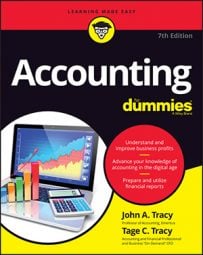The term accounting is much broader, going into the realm of designing the bookkeeping system, establishing controls to make sure the system is working well, and analyzing and verifying the recorded information. Accountants give orders; bookkeepers follow them. And accountants are paid better than bookkeepers.
Bookkeepers spend most of their work time keeping the recordkeeping process running smoothly according to the system established by the business — and they also spend a fair amount of time dealing with problems that inevitably arise in recording so much information. Accountants, on the other hand, have a different focus.
You can think of accounting as what goes on before and after bookkeeping. Accountants are in charge of preparing reports based on the information accumulated by the bookkeeping process: financial statements, tax returns, and various confidential reports to managers.
Measuring profit performance is a critical task for accountants — a task that depends on the accuracy and completeness of the information recorded by the bookkeeper. The accountant decides how to measure sales revenue and expenses (as well as any special gains and losses) to determine the profit or loss for the period. The tough questions about profit — how to measure it in our complex and advanced economic environment — can’t be answered through bookkeeping alone.
The important differences between bookkeeping and accounting are these. Bookkeeping has two main jobs:- Recording the financial effects and other relevant details of the wide variety of transactions and other activities of the entity
- Generating a constant stream of documents and electronic interactions and outputs to keep the business operating every day
Accounting, on the other hand, focuses on the periodic preparation of three main types of output: reports to managers, tax returns (income tax, sales tax, payroll tax, and so on), and financial statements and reports. These outputs are done according to established timetables. For example, external financial reports are prepared every quarter (3 months) and at the end of the year (12 months).
Tax returns have their own timetables, as dictated by the tax laws and regulations. Accountants have much more choice in deciding how often to prepare financial reports to managers. The managers of some businesses need daily financial reports; in other businesses, quarterly reports are adequate to keep on top of things.

